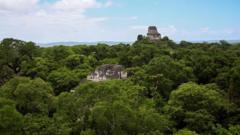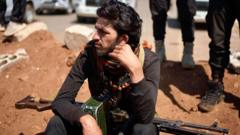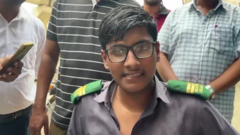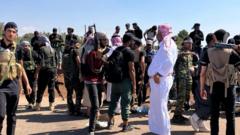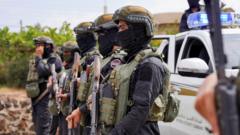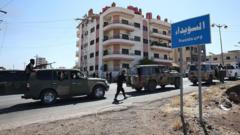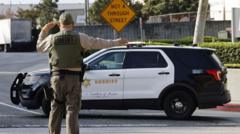As hundreds of thousands remain unaccounted for after Syria's civil war, medical professionals, led by Dr. Anas al-Hourani, embark on a monumental task to identify victims from mass graves. The effort reflects the pain and anguish of families still searching for their loved ones, as the reality of the grave's contents reveals a dark chapter in Syria's history.
Unraveling Tragedy: The Challenging Task of Identifying Victims from Syria's Mass Graves

Unraveling Tragedy: The Challenging Task of Identifying Victims from Syria's Mass Graves
Medics in Syria confront an overwhelming mission as they begin cataloging remains from mass graves, shedding light on the horrors of the civil war.
Dr. Anas al-Hourani stands amid a somber scene at the newly-established Syrian Identification Centre in Damascus, where tables laden with femurs tell stories of the past. "These," he notes gravely, "are from a mixed mass grave," indicating the grim context of his work, where victims have been piled upon one another. The Syrian civil war, which has spanned 13 years, has resulted in the loss of hundreds of thousands of lives, and many of these bones likely belong to individuals killed by both Bashar al-Assad and his father Hafez during their extended rule.
Dr. al-Hourani, a forensic odontologist, stresses the importance of dental remains for identification, while acknowledging the challenges they face due to the lack of facilities for DNA testing. With only one remaining DNA testing center in a war-torn country marked by destruction and sanctions, forensic experts struggle to gather necessary materials. The cost of DNA analysis hinders their work further, as each test is approximately $250, and in a mixed grave, multiple tests are required to piece together a single identity. Support from the International Committee of the Red Cross is vital as they embark on this painstakingly slow journey towards justice.
The new ruling government has emphasized "transitional justice," but many survivors, like those who have lost family members to enforced disappearances, have expressed frustration over the insufficient pace of change following Assad's abrupt ousting in December. The grim task of identification may take years, as Dr. al-Hourani admits it can take months to determine a single victim's identity from just one grave.
Along the outskirts of Damascus lie several mass graves—a stark reminder of the civil war's brutality. Accompanying the BBC team, Hussein Alawi al-Manfi, also known as Abu Ali, recalls his chilling experience of transporting bodies during his time with the Syrian military. He estimates he delivered hundreds of human remains, many bearing signs of torture and numbering from notorious detention centers, including Branch 215, the site of widespread abuses.
Malak Aoude returns to Syria after years in Turkey, confronting the painful reality of her two sons—both victims of the regime's cruelty. As she seeks closure, Malak reflects on her sons’ fates, torn apart during the regime's violent clampdown on dissent. Witnesses from the military detention center have shared chilling accounts that help maintain the memory of her sons, leaving her with the slimmest thread of hope.
For many like Malak, the fall of Assad initiated a new chapter filled with yearning and loss. Though the regime's grip has loosened, the pain of unresolved disappearances continues to linger, as families seek acknowledgment and clarity amidst staggering historic events.




